|
By Meg Moore 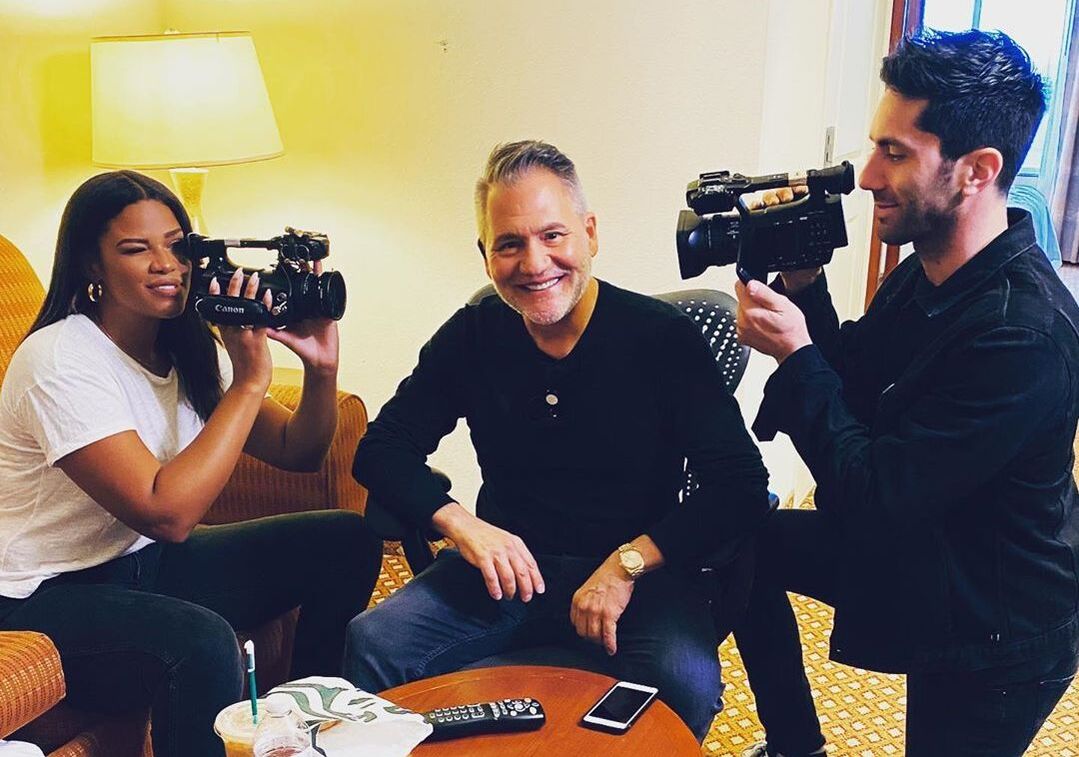 Hosts of MTV's Catfish Nev Schulman and Kamie Crawford film DP, John DeTarsio. Hosts of MTV's Catfish Nev Schulman and Kamie Crawford film DP, John DeTarsio. Dare to Dream Productions Podcast, director and host Bridget Johnson interviews the director of photography for MTV’s tv show, Catfish, John DeTasio. He speaks on how cameramen adapt to filming up close reality content in a pandemic. He served as the executive producer of creative development at NBC and was the DP for many of CBS’ 60 Minute segments. He’s a freelance cameraman and has been the DP on all of the seasons of Catfish. This University of Arizona Graduate also has experience with producing and directing. John’s interview has been edited and condensed for clarity. Watch the video version here. How did you land the job being the DP of the show. Did you work with Nev before? I had not worked with Nev before, but I was a fan of his documentary. I had seen that two years between the time that the documentary came out and the deal was done with MTV to make the pilot, when I got involved. Many things had to fall into place as you’ll learn the more and more you get into this business. Every relationship you have in the world you leave in a good place because you never know when they’re going to come back. I was aligned with the CEO of the production company that makes catfish for MTV. So MTV agrees on having a show, they hire a production company, and that production company boss I knew from back in the days when I did a lot of 60 Minutes and 48 Hours, he was a news producer. So he knew me as a magazine documentary guy. The person I told you about Tom Forman the CEO of this company had found David Metlzer, who had a very successful show called “Queer Eye for the Straight Guy”; the original one. He was known as a documentary real life, not “fake reality” but “real, reality” producer. I was connected with David through Tom, already we had been working on a few shows together. When Catfish came along, they just saw me as a really good fit, because of my background in news and documentary news magazine, along with my body of work. They felt that I was the right person because I really wanted to make an original real, reality show where you are discovering things as they happen and you walk into doors one time. You don't set up, you just go on intuition and the energy of where things are. They felt that that was my strong suit and that’s how it happened. We all kind of came together, we always say it was lightning in a bottle, we all kind of found each other accidentally. I’ve been in this business a long time, thirty-something years since I've graduated from college. I’ve been on many shows and I cannot tell you how rare it is to find a show that even gets out of the pilot and becomes a TV show. You’ve already done an incredible amount to just get a season of TV and then to make it two seasons is unbelievable. Never in my career have I been so lucky to be on a show where the core group of people are still the same, and we’re now 9 years later and 160 shows in. It’s been amazing, we take every day as a blessing, we just appreciate the fact that we’re still doing it, and we feel like we’re making a good show and in our way trying to send a good message. Even though the people on our show don’t come from the best positions, they’ve had a lot of struggles but everyone is a human being and that’s what we’re really proud of telling. You helped so many people find their love life with their lover that they’ve been searching for for years and not even talking to them on the phone. We still try to keep in touch with as many of these people as we can. Nev’s always receiving text messages from people from the past. Despite the limitations of not being able to travel to meet the catfish, and doing it on Zoom instead it was still highly entertaining. So what challenges did you face as a DP filming this show during the pandemic? If you were to direct a show and you can't speak or a camera person with one arm tied behind their back, it was very challenging. Like everybody else when the pandemic first came out everyone was scared, we all retreated to our homes and waited to see what was going to happen. It took a month, maybe longer when our executive producer and Nev and Kamie were all thinking “you know what, as many catfish there are in the world I would imagine there’s even more of that right now”. People are just stuck at home, people need to talk to people - we should see if there are still stories out there, so they kept the casting going and sure enough they’ve been able to find some really interesting stories. 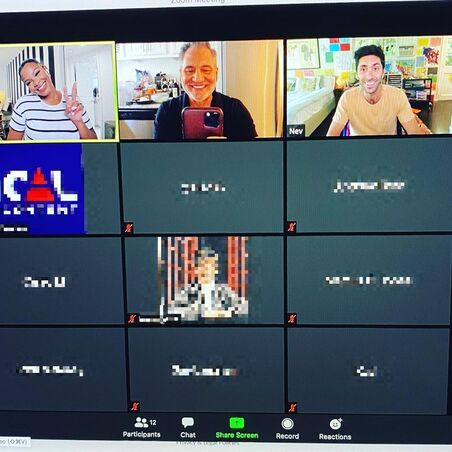 Zoom set-up for filming Catfish. Zoom set-up for filming Catfish. Zoom has been our savior, our ability to talk to each other and see what’s going on in real time. We send computers out to Nev and Kamie with software that we can control. We send a couple of small cameras to have as wide shots and through zoom I can explain exactly how I’d like to have the shot, and we can Facetime, and they can show me the shot, we did a lot of communicating like that. Our sound man has been able to find zoom recorders that take time codes, so we can sync the pictures to the sound so it’s editable. We found a way to do it. The main thing is having the software where my computer can talk to everyone else’s computer and our techs are able to make sure things are being recorded and that we get all the footage. The task gets more monumental because on a show like this, even though we wrap it up into a nice 45 minutes, one of our meetings might take four to five hours. So that’s a lot of footage that we need to group so that our post facility can gather that up and match where all the cameras are because we don’t have the ability to sync everything together like we do when we’re in the field. Bridget: It seems like a lot more work. Lots of challenges, you don't want to hear all of them. Our lives depend on good internet. It’s been quite a challenge but I’m so proud of Nev and Kamie, they’re amazing, and our post team who, even though we’re just sitting at the computer now, have found a way to still keep it so lively and interesting and I’m really impressed. It’s a small show and it looks like a small show but it’s a big family. Every stage of the way it’s impressive. 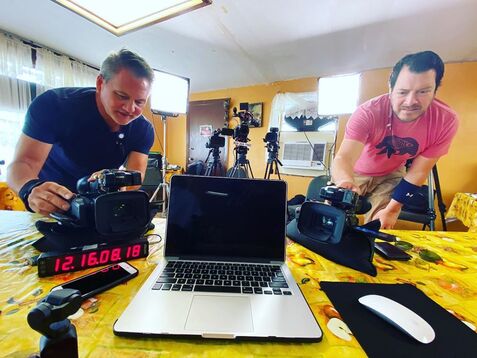 Catfish camera set-up before the pandemic. Catfish camera set-up before the pandemic. What did the camera set up look like before the pandemic? How many cameras and what kind? Before the pandemic I would travel with no less than 11 cameras. The cameras would range, A lot of point and shoot cameras that happen to shoot video. We started doing that very early on because Max was on the show with us - and Max and I were shooting basically everything. It’s hard to get all the angles one time through. Even though Max was just holding a little hand held camera - the intimacy he got from a person that was talking to him was an angle that was physically impossible for me to get unless I’m in the shot the entire time. We loved it and post loved it, and we really started to use those cameras a lot. We don’t use them as much anymore but I still take a couple of those, Kamie uses it quite a bit. I carry these little cameras (Cannon XF-205) , you can't even buy them anymore, because I think they came out in 2012. I love the camera because you have all the controls of a real camera, zoom, focus, iris control you can make it professional or you can do automatic audio settings. Kamie can take it and put it on her lap or walk around during one of our reveals like this on automatic controls, and she’s going to get something. She’s going to get an angle with the catfish looking right at the camera which we love - the raw intimacy is important to us. I also use C300 Mark II for when we’re sitting down. This is between the two (Canon XF705) which is a documentary camera, and we have five GoPro's. The reason why I have so many cameras is our show depends so much on someone's reaction. You don’t want to miss those moments. With less cameras you run the risk of missing things. We don’t do anything twice. Early on in the show I would sit in the middle and Max would shoot with his camera and it would be hand held and energetic and good, but we were missing a lot of so I added more cameras. A typical scenario is we are going to meet the hopeful, I might go to a set early and figure out where they’re going to sit, do some basic lighting, and drop off the cameras, but I don’t meet the hopeful (someone who writes into the show). We rig the car with GoPro's and then we’ll go back to the hotel. So when Ned and Kamie have their call time, they are already on camera - we follow them from the lobby to the car to the location. Me, my assistant camera, camera tech all hold the little cameras and walk into the house at the same time. We do this because we want Nev and Kamie to be part of the story. We don’t care how dirty it is, our biggest goal is to get the real reaction the first time, and we get all the honesty we can. No one actually meets the hopeful until the first day. We’ll roll the go pros and record their real goodbyes. That’s how you get real personalities and reactions. It’s complicated but it’s simple.
A little bit of control - still not as much as I’d like to have. That’s what just happened to your camera, I saw you move and the iris went up and the light changed. That’s what happens with these cameras; they're not professional cameras but at least we have a little control with them. I wish there was a way that if I were in control of your camera, I’d have some ability to pan, and tilt and zoom. There are cameras like that but you would have to be out in the garage not across the country. That would give me a lot more freedom but that’s why I have the other cameras locked down in wider shots for when those real moments happen. When you were on set during the pandemic did you have to get tested before and wear a mask? There was no set, our set was in the office, we sent them the equipment and taught them how to set everything up over zoom. But if I'm seeing Nev or Kamie we’re wearing masks, getting tested, taking all the precautions. What do you think the future of filmmaking looks like post pandemic? I’m still hopeful that we’re going to find our way back to each other. It’s not going to be overnight, it’s going to be a slow roll out, but I’m a history buff, and looking back through history we’ve had several pandemics, they’ve always subsided, and we’ve always come back together. We’re tribes people, we need each other. It won’t be overnight, I think it’s going to take a while, at first it’s going to be difficult shooting films, you're not going to find lots of extras in the background. People are going to have to write shows that don’t have big crowds. There's going to be scripted television where you go in, set up the shot get everything ready and then leave when the actors come in except for maybe two or three people, and they’re spread out pretty well. You won’t have all the crew and video village in the studio anymore. Slowly but surely as we get a handle on this and we get the vaccine, and the noise settles down and it becomes less deadly we’ll make our way back to each other. I believe that, I feel that. My son works on a reality tv show where they shot it in a bubble, it was very successful. The show basically bought up an entire resort, so the crew slowly arrived, got tested, quarantined, and nobody saw each other and finally, after all of that and time in quarantine they slowly got together and started building the show. There was no coronavirus, they shot the show for two months, at this one spread out location and it was very successful, they're planning on doing the next season very shortly. We’re all finding our way, I think the small shows are going to do okay, shows like Catfish because we don’t have big crews. MTV is being very cautious. When MTV is ready we’ll get Nev and Kamie back together in the same room. Maybe sitting a little further apart but that would be lovely seeing them together. Meet our people out in a park and stay outside and stay distant, we’ll find our way back. There are 20 of us on the Zoom associated with the show and at the end of our meetings Nev has us turn our cameras on, so we can all say hi. Do you have any advice for beginner DPs? There’s so many different avenues for DP’s, pick your lane. Really try as early as you can, what you really like, identify it. Are you super interested in multi camera sitcoms? Are you interested in films? Are you interested in taking over the corporate world? The YouTube world? And really focus in on that world and who the leaders of that particular lane that you pick are. Pick your path the way they picked their path. Obviously the easiest way is to go to a very prestigious school that hands out really amazing internships, and apply and win a great internship and go work for Martin Scorsese, that would be wonderful, but those things, that’s very rare. So you just have to pick your lane, really study the people you admire, how they did it, and learn from that. You don't have to follow their path - but learn from how they did it. You have to get to where the business is. I went to the University of Arizona, I had to find my way out to the west. still to this day there’s not a lot of work out there. Now I can go live there and commute after 35 years of connections, but I had to find my way and immerse myself in the world. Fall in love with story telling more than falling in love with your ability to shoot a gimbal shot or get nice lighting on a car. You have to know light, light is so important to know. Not just typical key light, backlight, accent light, actually study the light. When you’re sitting outside by a lake and you notice you feel really good, think about the light. When you’re looking at art and it makes you feel a certain way, think about the light. You can light with one single lamp, it might tell a story. You don’t need big toys, but obviously, understand the basics. Wide shot, medium shot, reaction shot, and understand the basic building tools of building a story. When I look at audition tapes and it’s just one beautiful shot after another, it really tells me nothing, I want to feel something when I watch. I want to feel stories and I want to feel that you understand story, you understand emotion, that there’s a person there. That directed or feels these shots. It’s not all about “look at this great drone shot I got”. 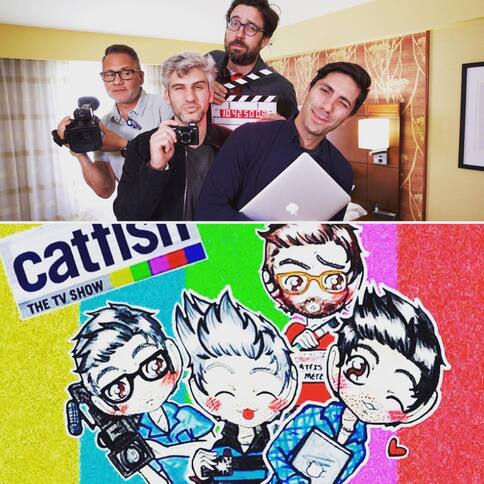 The magic behind MTV's Catfish. The magic behind MTV's Catfish. What’s next for you? Retirement hopefully. I figure I’ve got about ten years left in this business because I still enjoy it. I’m a freelancer so my life is still concurrent, I work for this company critical content, because of Catfish they have basically booked me in chunks at a time. They’ve got a lot of other projects going on, so I’m always working on other things. In fact this week and last week Catfish is dark, and I am working on a show with Kevin Hart who is doing a game show for E, called Celebrity Game Face, it’s also kind of a virtual show. Since COVID-19 our Catfish team has done a special for CBS, sort of shot in the virtual style Catfish episodes. People giving each other haircuts while we were at home in lock down. I’m out there doing other stuff but catfish is my main stay. I hope that Catfish continues on for a while. As I tell my friends all the time, us core people who have stayed with the show, we’re going to ride the wave all the way to the shore until MTV says okay it’s time to close the doors. We’re enjoying it. As far as other work goes I don’t really worry about that so much, but I’ve earned that. I’ve been around a long time so when I become available I know a lot of people and I can jump onto something else. I don’t have the big aspirations of “I need to shoot a feature film” because I’ve achieved everything I wanted to do. I’m not in it for any kind of attention, I get to direct shots, I get to pick cameras, I get to pick how the whole construction and the mood of the project is. When I was doing that on two minute news stories I was already happy, I had already achieved what I wanted to do. As different shows come along that’s great, but I’m just grateful that I get to do that. I get to manage a team, whether it’s two people or fifty people. I’m managing a team and trying to construct something for the visionary for the director or for the executive producer, trying to imagine what they're imagining and trying to bring that to life. It doesn’t matter if I’m doing it for something big or something small, I just enjoy doing it. I don’t think about what’s next, I just want to keep doing what’s now. Follow John DeTarsio on social!
2 Comments
|
AuthorBridget Johnson is the president and co-founder of Dare to Dream Productions. She writes and directs thought-provoking films that inspire others to follow their dreams. Archives
March 2021
Categories and authors
All
|
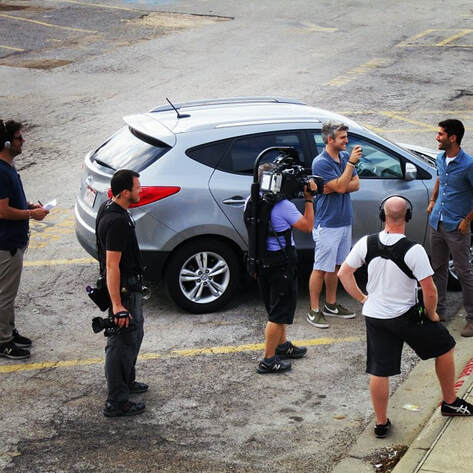
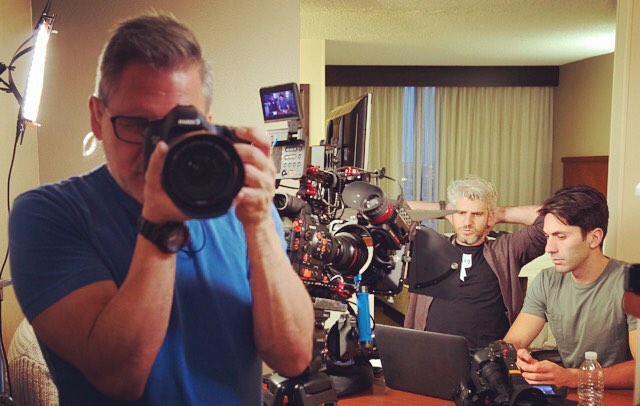
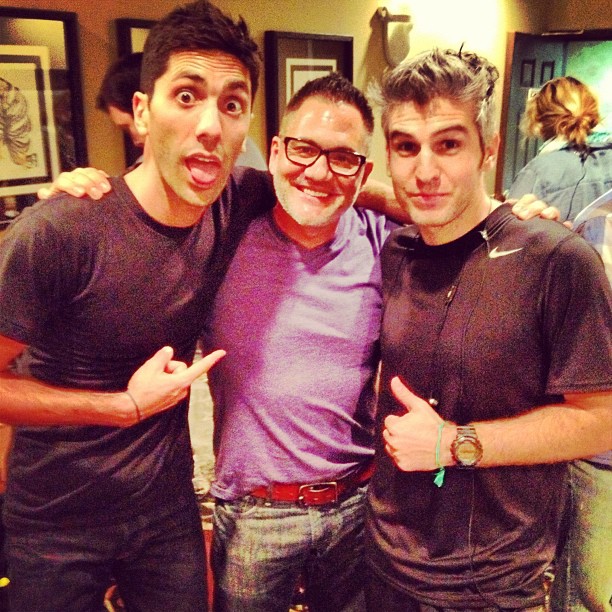
 RSS Feed
RSS Feed